第三人撤销之诉研究pdf在线阅读免费版|百度网盘下载
编者注:第三人撤销诉讼的规定从制度层面加强了对案外第三人权益的救济
第三方撤销诉讼具有特殊的制度背景,现行立法存在一定的粗鲁。有必要从原告资格、对象要求、撤销理由、法律效力等方面对我国第三方撤销诉讼制度进行反思和审视。细化建设,从抽象到具体,最终形成规范化运作。
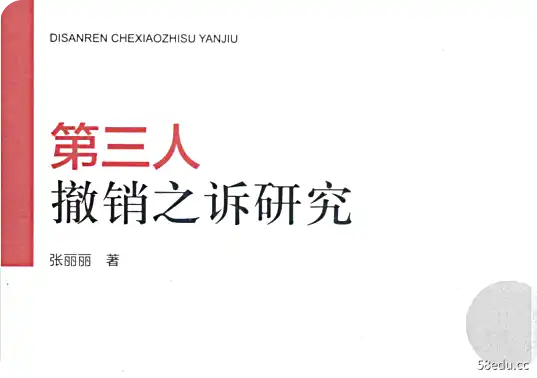
第三方撤销诉讼研究pdf电子版预览
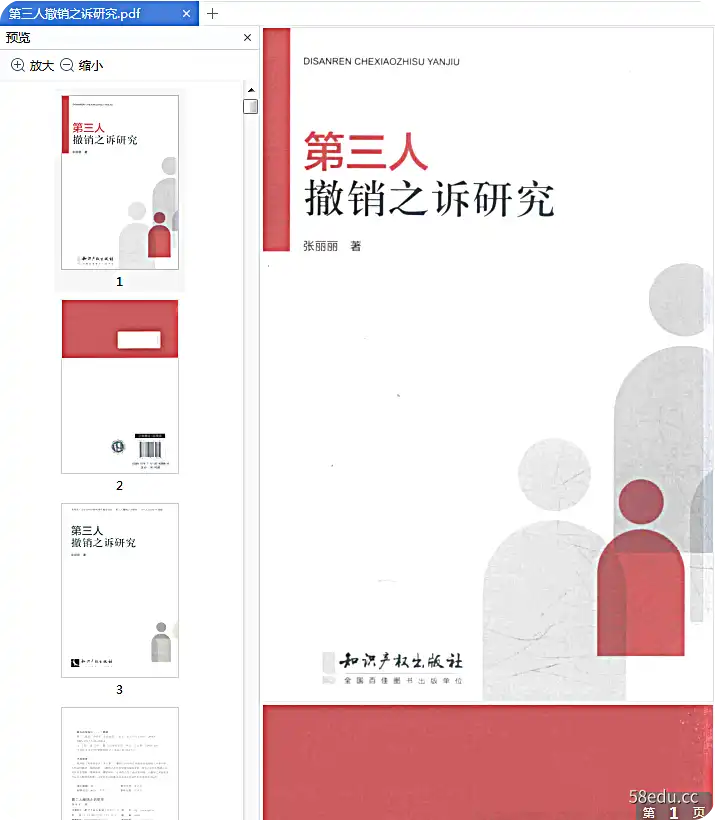
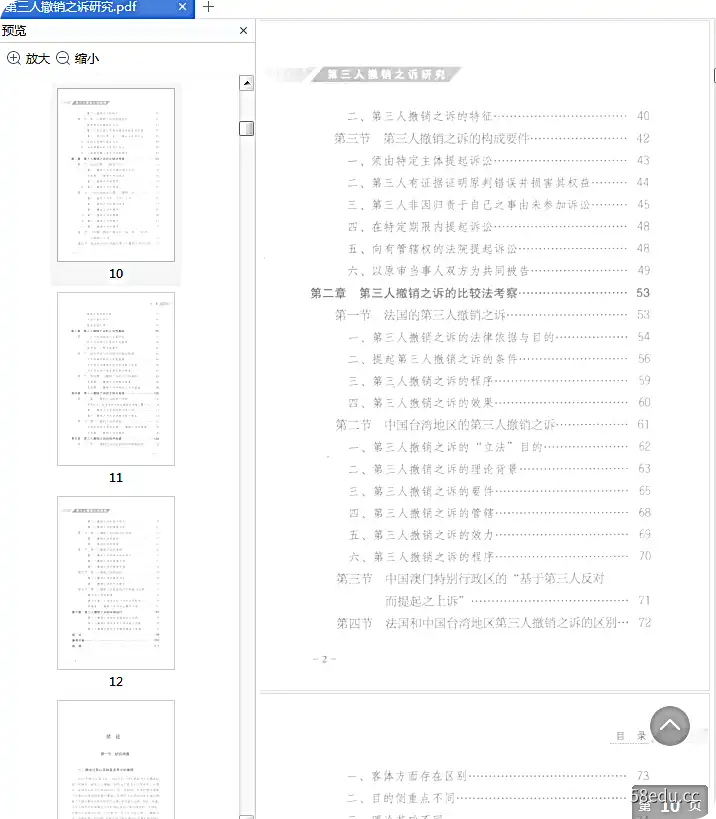
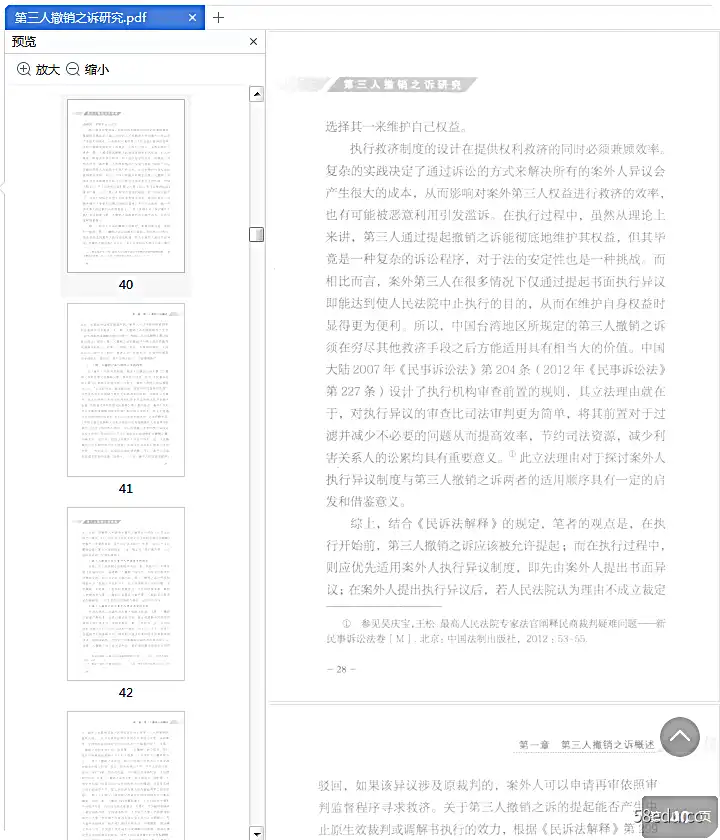
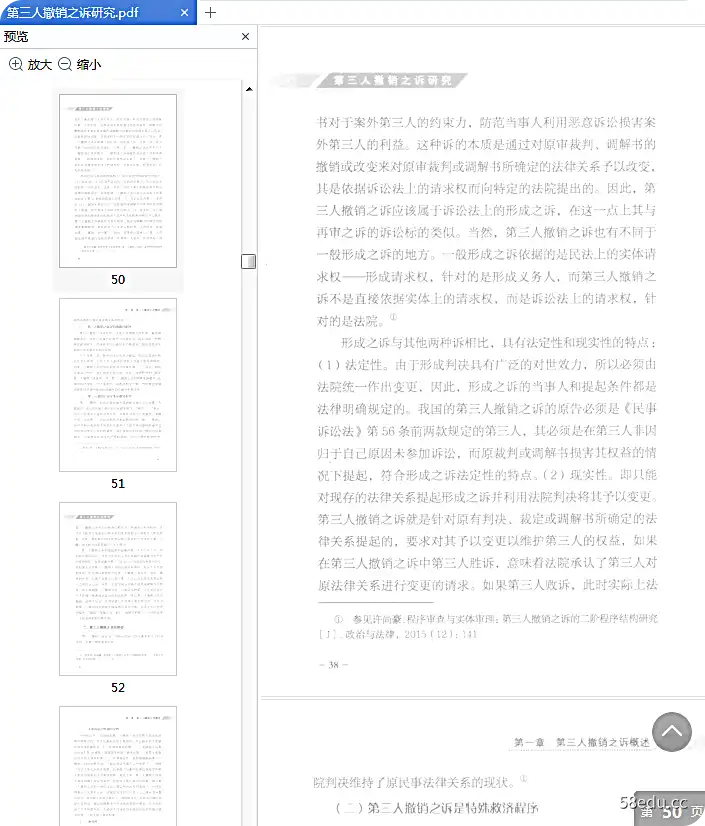
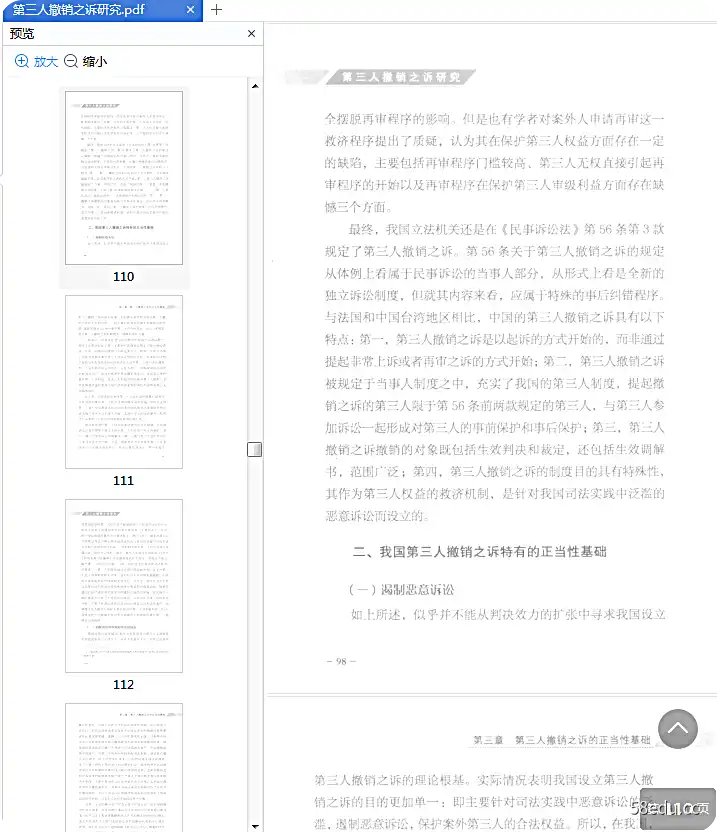
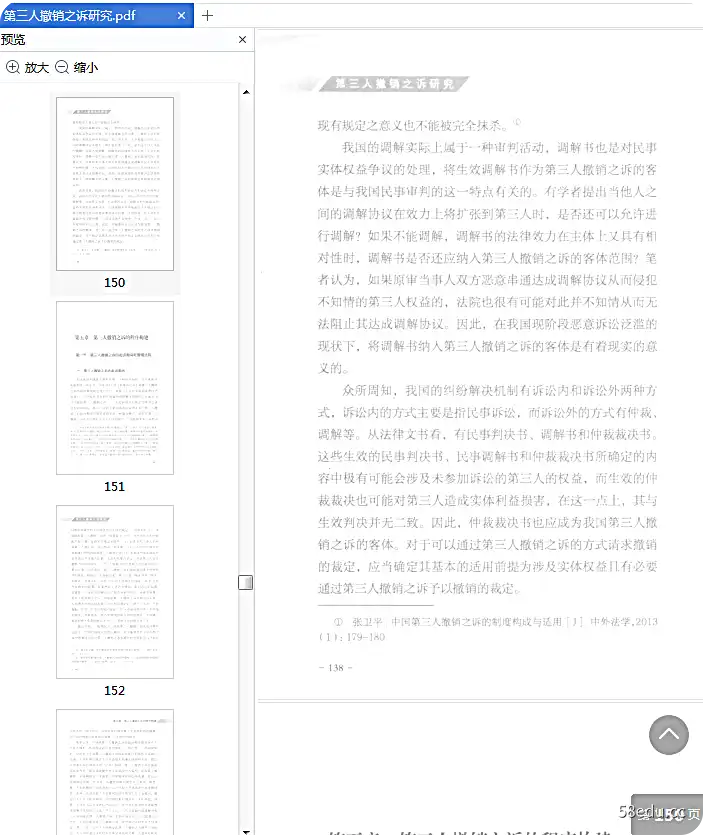
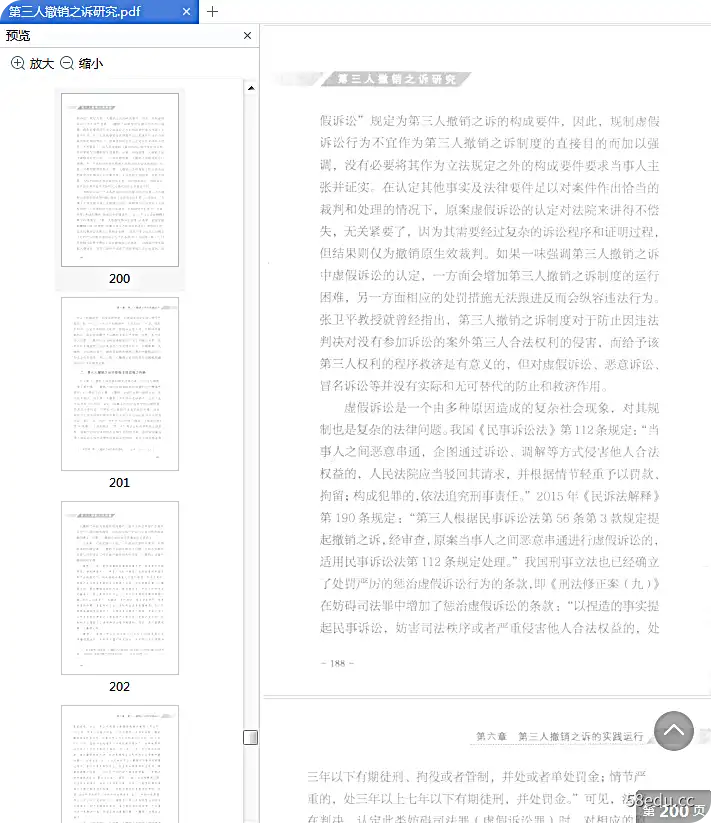
简介
2012年我国修改《民事诉讼法》时,第56条增加了第三人撤销诉讼的规定。在我国虚假诉讼案件频发、案外第三方权益屡遭侵害的特殊背景下,未参与诉讼的第三方有权提起撤销诉讼并申请作出生效判决、裁定、调解书的人民法院撤销有关侵害其民事权益的判决、调解书。权利救济。与域外立法相比,我国第三人撤销诉讼具有特殊的制度背景,但其在民事诉讼法中的规定只有一款,过于单一的立法设计无疑增加了制度适用的难度。相关程序规则的粗糙和多种救济程序的混乱并存,决定了现有制度还有相当大的改进空间。我国第三方撤销诉讼制度应从原告资格、客体要求、撤销理由、程序构建、法律效力等方面进行重新思考和细化,推动其从抽象走向具体,最终形成规范运作.同时,还需要明确第三方撤销诉讼与相关制度的界限,合理安排其法律适用。在第三人撤销诉讼的研究过程中,要正确认识和处理第三人利益保护与法律、司法权威等价值观的稳定之间的矛盾和冲突。
作者介绍
张丽丽,女,1977年出生,陕西人,中国政法大学民事诉讼法学博士,研究方向:民事诉讼法,习文学院讲师'一所科技大学。
目录
目录
简介1
第一节研究背景1
1、修改法律的过程和制度适用的激烈争论1
2、“终极”诉讼泛滥3
3、程序保障的发展与上诉权理论4
第二节研究现状与意义6
1、研究现状6
2、研究意义12
第 3 节研究思路、研究方法和创新 15
1、研究思路 15
2、研究方法17
3、创新18
第 1 章第三方撤销行动概述 20
第 1 节第三方撤销行为的概念 20
1、第三方撤销行为的定义 20
2、第三人撤销诉讼的歧视及相关制度23
第二节第三人撤销行为的性质和特点 36
1、第三方撤销行为的性质 36
2、第三方撤销行为的特点40
第 3 节第三方撤销诉讼的要素 42
1、诉讼必须由特定主体提起 43
第二,第三人有证据证明原判错误,损害其权益44
3、第三人非因自身原因未参与诉讼 45
4、限期提起诉讼 48
V。在有管辖权的法院提起诉讼 48
6、原审双方均为共同被告 49
第二章:第三方撤销诉讼的比较法律审查 53
第 1 节。法国的第三方撤销诉讼 53
1、第三方撤销诉讼的法律依据和目的54
2、提起第三方撤销诉讼的条件56
3、第三方撤销诉讼程序 59
4、第三方撤销行为的效力 60
第二节第三人在中国台湾的撤销诉讼61
1、第三方撤销诉讼的“立法”目的 62
2、第三方撤销诉讼的理论背景63
3、第三方撤销行为的要求 65
4、第三方撤销诉讼的管辖权 68
V。第三方撤销行为的效力 69
6、第三人撤诉程序 70
中国澳门特别行政区第3条“基于第三方异议的上诉”71
第四节法国与台湾的差异,中国的第三方撤销诉讼72
1、对象有区别 73
2、目的的侧重点不同74
3、理论基础不同74
第三章第三人撤销诉讼的正当依据76
第 1 节基于合法性的现有主要理论 76
1、弥补扩大判决效力的不利影响76
第二,授予第三方程序保障权82
第二部分:现有理论与中国现状的符合程度 84
1、中国特别资源裁判制度背景85
2、我国程序保障理论研究与实践现状86
三个。我国相关理论发展展望87
第三节我国第三方撤销诉讼的合法依据89
1、我国第三人撤销诉讼的具体背景89
2、我国98第三方撤销诉讼的独特合法性基础
第四章第三人撤销诉讼的主客体106
第 1 节:原告对第三方撤销诉讼的资格 106
1、现行规定不能涵盖所有被生效判决108侵权的第三方
2、第三人撤销诉讼中原告资格的分类分析112
3、第三方撤销诉讼原告资格打字筛选123
第2节第三方撤销行为的对象135
1、法国和中国台湾第三方撤销诉讼的对象135
2、我国第三人撤销诉讼的对象136
第 5 章:第三方撤销诉讼 139 的程序构建
第1节第三人解雇诉讼的起诉期限和管辖法院139
1、第三人撤销诉讼的起诉期限139
2、第三人撤销诉讼的管辖法院142
第 2 节:起诉和接受第三方撤销诉讼 143
1、起诉第三方撤销诉讼143
2、接受第三方撤销行为 147
第 3 节:第三方撤销诉讼 150 的审理
1、第三人撤销诉讼的审理组织150
2、第三人撤销诉讼的审理程序151
3、第三方撤销行为的范围154
第 4 节:第三方撤销诉讼 156 的法官
1、第三方撤销诉讼判决书156
2、第三人撤销诉讼的判决效力159
第 5 节:第三方撤销行动 176 配套程序的构建和完善
1、建立诉讼通知制度176
2、建立第三方滥用申诉权的处罚机制179
3、明确第三人撤销诉讼的诉讼费用问题183
第六章第三方撤销诉讼实务操作185
1、第三人撤销诉讼规范虚假诉讼行为185
2、第三人撤销诉讼中原告资格的判断189
3、第三人撤销诉讼纠正原审法官错误的实践194
结论 198
参考文献 200
感谢 211
优秀的试读
第一节研究背景
1、修法过程与制度适用的激烈争论
2012年我国民事立法和司法领域的一件大事是《民事诉讼法》的修改。程序法的创新。法律的修改给民事诉讼理论研究带来了新的繁荣。民事诉讼法修改前后,涌现了大量关于民事诉讼理论研究的著作。研究人员争论、交谈、交流,不同内容的思想碰撞成为这一阶段的民事诉讼程序。诉讼理论研究的一大特色。在修改《民事诉讼法》的过程中,是否应设立第三方撤销诉讼的问题颇具争议。虽然法国《新民事诉讼法》和中国台湾《民事诉讼法》建立了第三方撤销诉讼制度,但相关问题和争议一直存在,相关问题和争议主要针对制度的建立和制度本身的不足。 2003年台湾《民事诉讼法》修改前后,设立第三方撤销诉讼成为争议最大的问题之一。在明确规定第三方撤销诉讼后,反对者指出,这一新制度的“立法”过于草率和深思熟虑,是域外法律移植的失败。在讨论修改我国《民事诉讼法》时,理论界对于是否增设第三人撤销诉讼制度存在诸多争议。反对者认为,不应减损法院判决的终局性和司法权威性。调整再审申请主体范围,完善再审程序,为第三人合法权益提供救济。对于驳回虚假诉讼判决,采用再审程序应该是最好的办法。第三方撤销诉讼仅受法国、中国台湾地区和中国澳门特别行政区管辖。在境外监管很少的情况下,在中国建立这一制度的必要性值得商榷。赞成建立这一制度的学者,结合我国虚假诉讼、恶意诉讼泛滥的现状,认为一味扩大再审范围并不是好事,由此产生的负面影响也无法消除。被忽视的,比如救济费用的增加和再审制度运行的负担。等待。第三方撤销诉讼在遏制虚假诉讼、恶意诉讼、保护第三方权益等方面可以发挥独特的作用,具有其他救济程序无法比拟的优势。倡议者还在民事诉讼法修订草案中构思设计了第三人撤销诉讼的具体规定,以保护第三人的权益。在法律修改后和2015年《民事诉讼法解释》通过前后,第三人撤销诉讼仍是民事诉讼法理论研究的热点问题。结合民事诉讼的基本理论,深入分析了第三人撤销诉讼的法律问题、诉讼要素及第三人撤销诉讼的运行状况,阐述了制度的进一步建设和完善。 .诉讼立法的完善为理论研究奠定了基础。
2、“终极”诉讼泛滥
近年来,诉讼主体滥用诉讼权利、恶意诉讼已成为困扰我国民事诉讼司法实践的一大难题。以虚假自白、虚假陈述或诉讼欺诈等方式影响诉讼进程,从而谋取不正当利益,导致真相被严重欺骗的情况屡见不鲜。此类诉讼在实践中分为虚假诉讼、恶意诉讼和冒名顶替诉讼三种类型。有学者认为,虚假诉讼、恶意诉讼、冒名顶替诉讼虽然都可以归类为滥用诉讼权利,但虚假诉讼在诉讼之外与其他两种不同。如果第三人不知道诉讼的存在,其判决一旦成立,势必损害第三人的合法权益。如果从广义上理解,虚假诉讼和虚假诉讼都应该包括在恶意诉讼的范畴内。虚假诉讼、虚假诉讼的肇事者在案外侵犯第三方权利的行为充分体现了“恶意”。因此,在本书后面的讨论中,在没有歧义的情况下,均采用恶意诉讼来指代此类诉讼。从理论上讲,判决效力的相对性决定了生效判决只对特定法律关系的主体具有约束力,诉讼外的第三人一般不受他人之间判决的直接影响。但问题的症结在于,虽然判决有效性的相对性问题在理论研究中早已涉及,但我国并没有真正确立判决有效性的相对性原理。无论是实务部门还是普通大众,判断有效性的相对性都是一样的。由于缺乏一定的认识,因此在实践中,侵害第三方权益的恶意诉讼时有发生。
3、程序保障的发展与上诉权理论
程序利益概念是随着对中国程序理论的深入研究而出现的一个法律概念。尤其是在学者们将注意力转向程序利益保护功能之后,程序利益的概念受到了广泛关注。对于民事诉讼的主体,在请求法院维护其实体利益的同时,也可以维护其相关的程序利益。也就是说,从维护当事人利益的角度,受理案件的法院一方面应当履行查明真相的职责,同时也应当保护当事人的相关程序利益。另一方面。在这方面,中国台湾的程序利益保护理论提供了宝贵的经验,可供大陆相关研究借鉴。中国台湾的程序利益保护理论起源于1980年代。台湾学者邱连功是程序利益保护理论的倡导者。他对程序利益的概念进行了系统而详细的阐述。他认为:“相关民事诉讼制度应在司法实践和理论理论如何构建或运行中,一直使用诉讼经济的概念,主要是为了达到其避免重复程序或减轻负担的目的。法院,从而寻求正当理由,而很少能表明其是出于保护当事人利益的意图,这种态度的形成可能是由于传统主义者对当事人如何处理的认识不足应该保护自己的诉讼主体地位;一直受到理论的影响,有法律制度演进的原因。因此,不难看出,一向重视诉讼经济概念的人大多指向试图实现其禁止、限制或限制当事人的某种诉讼行为,从而处理是否呃在程序上应该受到一定的限制。在这里,评论员不知道如何积极寻求允许或协助一方做某事以保护其合法利益或给予其机会追求争议实体除法律利益之外的程序和法律利益并非旨在理清减轻法院负担与保护当事人利益的关系,从目的上来说,是利弊的关系,还是哪个更重要。”诉讼权理论起源于大陆法系国家,在民法民事诉讼法理论领域,诉权理论一直受到高度重视,学者们对诉权理论进行了大量深入的探讨和研究。与诉讼权理论相关的实际问题在普通法系国家的民事诉讼法理论领域也受到了相当的关注。 -当事人撤销诉讼是对权利受到生效判决侵害的第三人权益的救济和维护,也是诉讼权保护的一部分。诉讼目的论、诉讼权利论和资源判断本质论被视为传统民事诉讼的三大基本理论。诉讼权理论回答了“当事人为什么可以提起诉讼”的基本理论问题。无论是现代大陆法系国家还是普通法系国家,民事诉讼法理论研究的独立性和相关制度框架在很大程度上都离不开诉权理论中的权利保护诉求,本案的判决请求。应该明确的是,上诉权不仅应该是理论上的问题,而且应该是一个实际问题。我国过去对诉讼权的理论研究过于抽象,没有与具体的民事诉讼制度和司法实践相结合。实践中滥用诉权的现象也很普遍。 2012年民事诉讼法的修改在一定程度上体现了对诉讼权利的保护,对民事司法提出了更高的要求,从而直接或间接地保护了当事人的权利。可以说明这项立法的新动向。
第二节研究现状与意义
1、研究现状
在民法体系中,法国和德国的民事立法模式完全不同,其民事立法和民事诉讼理论也不同。目前,只有中国台湾地区、中国澳门特别行政区和法国对第三方的撤销行为作出了规定。就其规定的先后顺序而言,法国《新民事诉讼法》首先规定了这一制度,中国台湾地区也将其引入2003年颁布的《民事诉讼法》,中国澳门特别行政区规定“上诉基于第三方反对”在其特别上诉系统中。此外,日本旧的民事诉讼法对第三方撤销诉讼有规定,后来在新的民事诉讼法中被废除。在法国,第三方翻案诉讼是第三方为保护当事人的利益免受判决撤销或变更判决而提起的诉讼,对已成立的判决中的相关事实或法律问题提出质疑。是具有补救性质的补救措施。法国学者从扩大判决效力和防范欺诈诉讼两个基本方面对第三方撤销诉讼进行了研究,具体涉及第三方撤销诉讼的主体、客体、审判程序和判决效力。关于是否成立第三方撤销诉讼,中国台湾理论界一直存在激烈而深入的争论。邱连功教授在民事诉讼法研讨会上多次提出,该制度应参照法国立法建立,以加强对第三人事后程序的保护。他领导的“新程序保证论”批判性地反思台湾传统的民事诉讼制度和理论,认为德国、日本等大陆法系国家,传统上偏重和偏爱民事诉讼制度。诉讼经济。民事诉讼的相关理论在概念上也十分注重诉讼经济,而忽视了当事人的程序主体地位。基于这一反思,邱连功教授提出了一套对台湾民事诉讼制度建设产生深远影响的程序保障基础理论。正是在这种思潮的影响下,中国台湾地区最终建立了第三方撤销诉讼制度。但也有相当一部分学者认为,台湾的制度和做法与法国有着根本的不同,不应该建立这种制度。其中,对此反对最为激烈的前“司法院法官”、台湾著名法学家姚瑞光先生曾严厉认为,设立第三方撤销诉讼是“儿童剧立法”, “荒谬的创新”。但最终,在程序保障理论的大力支持下,中国台湾地区仍然建立了第三方撤销诉讼制度。学界普遍认为,第三方撤销诉讼的立法目的是配合权限通知制度,形成第三方利益的事前、事后保障制度,实现“一次性解决纠纷”和“程序保障”。鉴于该制度的建立已成定局,学界已开始就其程序建设、司法适用等具体问题展开讨论,并涌现了大量相关著作。中国澳门特别行政区的“第三方异议”比法国和台湾的更为直接和狭隘。如果他们不知道他们的权利和法院不知道欺诈行为,他们有机会上诉以捍卫自己的权利。
在2012年我国民事诉讼法修改之前,由于第三人撤销诉讼在大陆法系国家并不常见,因此对第三人撤销诉讼的理论研究并未充分开展。在修法期间,学界开始关注这一制度,各种研究成果层出不穷,对我国建立这一制度既支持也反对。反对者认为,第三方撤销诉讼不适合我国目前的司法实践,再审程序在我国已存在被任意启动的危险。裁判的终局性和权威性已经形成了相当大的影响和威胁。在此背景下,第三方撤销诉讼制度的建立无疑将进一步削弱有效裁判的终局性和权威性。我们可以通过调整再审申请主体范围、完善再审程序来保护第三方的合法权益。中国的第三方参与诉讼制度、程序保障的概念和制度等与中国台湾有着根本的不同,域外立法的盲目借鉴和移植不可取。学界普遍认为,第三人撤销诉讼的性质为形成性诉讼,是一种特殊救济程序和事后救济程序。基于遏制恶意诉讼和保护第三人权益的现实需要,主张设立第三人撤销诉讼的学者主要介绍其背景、内容,并探讨其在我国的解释和适用。认为一味扩大再审范围会导致救济成本增加,不利于再审制度的正常运行,建立第三方撤销程序不仅能解决恶意诉讼判决对第三人权益的损害,也有效解决了在扩大判决效力的情况下对第三人程序权利和实体权利的事后救济问题。支持者基于规范分析的视角,对第三方撤销诉讼的目的、意义、性质、特征、主体、客体、程序、判断效果等基本问题进行了细致深入的分析。为保护权益,民事诉讼法修改草案对第三人撤销行为的具体规定进行了构思和设计。新形势下,针对现实中恶意诉讼猖獗的现实,为加强对受害第三人的救济,修订后的《民事诉讼法》增加了第三人撤销诉讼制度。在立法已经明确规定的情况下,对第三方撤销行为的理解和适用成为理论界和实践界必须关注的问题。理论家们的研究重点是对现有立法规定的评估和分析,以及对制度运行中出现的问题的讨论。学者们从原告资格、程序建设、判决效力等方面对我国第三方撤销诉讼制度进行了反思,并提出了制度完善和建设的具体思路。研究主要围绕以下几个问题:一是程序建设问题。程序建设问题是学术界的一个关键问题。学者们根据《民事诉讼法解释》关于第三方撤销诉讼的规定,对现有程序事项进行了详细研究,对第三方撤销诉讼进行了审查和受理。就审判程序、判决效力等法律未规定事项进行了深入讨论。有学者主张第三方撤销诉讼的审查受理、审理程序参照我国台湾地区的相关规定。第三人的第一救济应适用于普通程序,更多的学者只讨论程序构建的理论基础,而没有对程序的具体构建下结论。二是原告资格问题。 The qualification of the plaintiff is related to important issues such as whether the third-party revocation action can be effectively operated and whether it will be abused. Three people, there are big problems, which are not conducive to the realization of the legislative purpose. It is necessary to reasonably explain the plaintiff's eligibility issues and build a new plaintiff's eligibility standard from the original intention of the legislation. But there is a lack of in-depth discussion on how to refactor. Finally, the application order and relationship between the third-party revocation lawsuit and other third-party relief systems. There are different views in the academic circles on this issue, some advocate giving the third party the right to choose the procedure, some suggest clarifying the order of application of each system, and some discuss the cancellation of other related systems. The Interpretation of the Civil Procedure Law in 2015 clarified the relevant issues to a certain extent, and stipulated that during the trial of a third-party revocation case, if the people's court retrials the effective judgment, ruling or mediation decision, the third-party revocation lawsuit shall be accepted. The People's Court of the People's Republic of China shall rule to incorporate the third party's claims into the retrial procedure. At the same time, it also stipulates that if the enforcement of the effective judgment, ruling or mediation document is not suspended after the third party files an action for revocation, the enforcement court shall examine the enforcement objection raised by the third party in accordance with Article 227 of the Civil Procedure Law. If a third party refuses to reject the enforcement objection ruling and applies for retrial of the original judgment, ruling or mediation document, the people's court will not accept it. If a person outside the case refuses to accept the ruling of the people's court rejecting his objection to enforcement, and believes that the content of the original judgment, ruling, or mediation document is wrong and damages his legitimate rights and interests, he shall apply for a retrial in accordance with Article 227 of the Civil Procedure Law, and file a third party's action for revocation. , the people's court will not accept it. Generally speaking, the current theoretical circles are very enthusiastic about the third-party revocation lawsuit, but in terms of how to coordinate its relationship with the existing system, the plaintiff's eligibility criteria, how to deal with the relationship between the previous lawsuit and the later lawsuit, and the basis of the right of claim, etc. There is still a lack of further in-depth and systematic discussion, and further research is needed to form a roughly unified viewpoint and opinion.
Second, the significance of the research
Study on the third-party revocation lawsuit has important theoretical and practical value.
1、 Theoretical value
First of all, this research is helpful to expand the field of research on civil litigation theory in my country. The third-party revocation lawsuit is inherently related to the basic principles of good faith and disciplinary principles in my country's Civil Procedure Law, and it is also closely related to the system of third-party participation in litigation, execution objection by outsiders, and applications for retrial by outsiders. even overlap each other to a certain extent. The study of the third-party revocation action will inevitably involve the balance between the certainty of the effective judgment, the stability of the legal relationship, the protection of the interests of the third party and other values, and will affect the third-party system in my country's civil litigation and the power of civil judgments. The construction or improvement of specific systems such as the system has a positive impact, and provides theoretical explanation and support for it, thus highlighting the judicial relief of civil litigation
Function.
Secondly, this research is a rethinking of the method and intensity of the protection of third party rights and interests in my country. Before the revision of the Civil Procedure Law of my country in 2012, the protection of the legitimate rights and interests of third parties was mainly carried out through the system of third party participation in litigation, the system of objection by outsiders in enforcement procedures, and the system of application for retrial by third parties outside the case. There are corresponding problems in protecting the rights and interests of third parties. The establishment of the third-party revocation lawsuit fills the gaps and deficiencies of the original system in the protection of third-party interests, and provides a legal relief channel for victims whose legitimate rights and interests have been maliciously infringed against the background of the proliferation of malicious lawsuits. The provisions on the subject and cause of the third-party revocation lawsuit also reflect the natural extension and connection between the third-party revocation lawsuit and the relevant systems in terms of rights and interests relief. The establishment of the third-party revocation lawsuit has formed a more complete and three-dimensional system for the protection of the rights and interests of the third-party outside the case in my country's civil procedure legislation.
Finally, this study is a reflection on the design of my country's traditional civil litigation system. In the design of the traditional civil litigation system, not much consideration is given to the publicity and social nature of the litigation, but it pays great attention to the impact of the litigation on the parties. However, in the context of the proliferation of malicious lawsuits, an effective judgment will often infringe the legitimate rights and interests of third parties outside the case in the determination of facts or judgment results, thereby violating the principle of procedural safeguards and having a negative impact on the public and social nature of the lawsuit. . The establishment of the third-party revocation action provides an opportunity to rethink the protection of the rights and interests of the third party, and also challenges the value orientation of the design of the traditional civil litigation system in my country. In this process, the reflection on the design of the traditional civil litigation system will become a inevitable.
2.Practical value
First of all, this research can curb the widespread malicious litigation phenomenon in judicial practice. Curbing malicious lawsuits is the most direct reason for the establishment of third-party revocation lawsuits in our country's legislation. The design of the original civil litigation system in our country lacks perfect, effective and operable means to deal with malicious litigation, and cannot meet the practical needs of curbing malicious litigation. However, some specific operations in reality have expanded the space for malicious litigation to exist and further eroded the legitimate rights and interests of third parties. The establishment of the third-party revocation lawsuit enables third parties outside the case who have been infringed by malicious lawsuits to protect their rights and interests by filing revocation lawsuits, providing post-procedural guarantees to the third-party outside the case and making up for their lack of participation in the proceedings. , which is bound to promote the construction of the integrity mechanism of civil litigation and achieve the direct purpose of curbing malicious litigation.
Secondly, this research can strengthen the protection of the rights and interests of third parties outside the case in judicial practice. Under normal circumstances, litigation only resolves problems and disputes between the parties, and the usual relief procedures are only set up for the parties to the lawsuit. Only in special circumstances will the protection of the interests of the third party be involved, and the third party revocation action It is a litigation system based on special relief for the rights of third parties. Especially when the existing system still lacks the protection of the third party, it gives the third party who has not participated in the lawsuit the right to apply to the court to revoke the effective judgment or mediation statement that damages their civil rights and interests, and provides the third party with ex post facto information. Procedural safeguards take this as the main concept of the application of the system, strengthen the protection of the legitimate rights and interests of the third party, and open up a new space for the third party to remedy the rights.
Again, this research can enrich and smooth the operation of civil procedure in our country. In the specific application of the third-party revocation lawsuit, the conflict between the protection of the rights and interests of the third party and the stability of the law and judicial authority must be resolved. This is also the focus of this book. This study further rethinks and reconstructs the plaintiff's eligibility, procedure construction, judgment effectiveness and other issues in the third-party revocation action by fully demonstrating the relevant basic theoretical issues. The goal is to build a balance and coordination of the various systems of the third party's revocation lawsuit, the outsider's execution objection, and the outsider's application for retrial, in order to minimize the occurrence of malicious lawsuits in the constraints and restrictions, so that the litigation procedures can be enriched. , stable
Run.
Finally, this study can provide ideas and methods for solving new problems in judicial practice. After the revision of the Civil Procedure Law of my country in 2012, since the beginning of 2013, there have been cases of third-party revocation lawsuits in various places. The existing data shows that there are even third-party revocation lawsuits in two-level courts in Foshan City, Guangdong Province. A large number of new situations have emerged, among which there are also cases where a third party abuses the right of action to file a revocation lawsuit. However, because the legislative provisions are too simplistic, there are certain differences of opinion in judicial practice on issues such as filing, acceptance, qualification of plaintiffs, and trial procedures of such cases. The promulgation of the Interpretation of the Civil Procedure Law in 2015 has played a certain guiding and normative role in the judicial practice of third-party revocation lawsuits in my country, but there is still considerable room for procedural improvement in third-party revocation lawsuits in my country.本节对上述问题均进行了深入研究,可为我国第三人撤销之诉程序的构建和完善提供理论支撑,从而为解决司法实践中出现的新问题提供思路与方法。
第三节?研究思路、研究方法与创新
研究思路是研究者分析问题的基本逻辑,研究方法是分析问题和看待事物的基本手段,创新点是研究者运用研究方法得出的具有创见性的智慧结晶,是区别于相同或者类似研究的重要标志,也是他人看待和评判本项研究的基本出发点。任何研究都应该具有自身特色的研究思路、研究方法和创新点,对第三人撤销之诉的研究亦是如此。本节就本书采用的研究思路、研究方法和创新点予以简要概述。
1、研究思路
本书探讨的是第三人撤销之诉的相关法律问题,主要基于我国特有的制度背景,以现有立法的缺陷与完善为着眼点,侧重对现有制度的分析与完善,根本目标是制度的合理完善与构建,以促使第三人撤销之诉制度在我国民事诉讼司法实践中的平稳运行。2012年《民事诉讼法》的修改为第三人撤销之诉的研究提供了契机,民事诉讼法学理论界对该制度的目的、意义、性质、特征、主体、客体、程序及判决效力等基本问题进行了详细、深入的分析,但在如何协调其与已有制度关系、原告适格标准、如何处理前诉与后诉的关系等方面尚缺乏进一步深入、系统的探讨,有待于更深层次的研究以形成大致统一的观点与看法。因此,本书就以上述内容为基础,为我国第三人撤销之诉制度的立法完善、实践运行提供思路与理论
支撑。
本书的具体研究建立在比较法考察的基础上,重点围绕我国设立第三人撤销之诉的背景和我国的立法、司法实践现状展开。论述了第三人撤销之诉制度与相关制度的界限;提出了我国设立第三人撤销之诉制度的特殊背景和其正当性基础;结合我国第三人制度中第三人的范围对第三人撤销之诉的原告资格问题进行了深刻的反思与重构,对我国第三人撤销之诉的特有客体进行了评价与分析;结合2012年《民事诉讼法》修改后司法实践中的新问题以及《民诉法解释》的相关规定提出了完善我国第三人撤销之诉制度的具体策略;对第三人撤销之诉具体审判程序和相关配套程序的构建、完善以及第三人撤销之诉判决的效力等问题进行了深入探讨;对近年来第三人撤销之诉的司法实践结合相关理论及典型案例进行了相应的分析、评判与总结。分别对应第一章到第六章的内容。
2、研究方法
1.多维分析方法
诺内特和塞尔兹尼克认为,法律制度是多维度的,并处于不断流变之中。但是,“无论可变性是什么,我们都必须假定法律经验具有某些使它区别于其他社会现象的独特属性”。民事诉讼制度亦是多维的,实践也已证明,一维的研究方法带来的只是片段和琐碎的民事诉讼图景。
对第三人撤销之诉制度的研究结合我国司法实践中恶意诉讼泛滥的现状,试图与民事诉讼诚信原则、第三人参加诉讼制度、案外人执行异议制度、案外人申请再审制度等不同层面的原则或制度平衡、协调,以建立保护第三人合法权益的综合司法救济体系。而在此过程中不同维度、不同视角下的综合分析与研究至关重要。
2.过程分析方法
日本学者棚濑孝雄在研究纠纷解决过程时主张从制度分析方法转向过程分析方法,他认为,为了达到完整地分析复杂的社会过程的目的,就应该关注构成这些社会过程的现实社会中的个人行动,将其作为研究的焦点。这并非全盘否定制度分析方法,在必要时过程分析方法还要与制度分析方法相互结合来分析问题或者证明命题。
本书采用过程分析方法,对第三人权益保障的事前、事后的不同阶段及强度进行了充分研究。结合第三人参加诉讼制度的完善、诉讼通知制度的构建和第三人滥用诉权行为的惩罚机制的构建等问题展开对第三人撤销之诉制度的探讨,最终对该制度的完善与全面构建提出了具体的设想与安排,并探讨我国现有制度背景下第三人权益保护的动态全景。
3.类型分析方法
类型分析方法是按照一定标准将研究对象划分为不同类型,同种类型的事物具有相同或者相似的性质或者特征。它是认识和甄别事物的重要方法,近些年为越来越多的法律学人所利用。
类型分析方法也是研究第三人撤销之诉的基本方法。根据诉讼阶段的不同,我国民事诉讼法分别对第三人权益保护设置了不同的方式与路径,各种途径既相互联系又各有区别且互相牵制,如何在第三人利益保护的不同路径中寻找平衡,如何在现有立法框架内寻求不同情形下第三人利益保护的合理出路,是本书的研究重点,也可在一定程度上促使第三人权益保护的司法救济类型更趋细致与严谨。
3、创?新
第三人撤销之诉是我国民事诉讼法的新规定,它预示着相应司法实践的新开始,研究第三人撤销之诉制度必须结合我国的立法和司法实践现状,进行多角度多层面的探索性思考。本书对第三人撤销之诉制度进行了系统的探讨,主要有以下3方面的创新。
第一,紧密结合我国第三人撤销之诉的立法背景展开研究,并以此为基础上重点探讨我国第三人撤销之诉的合理完善与程序构建。虽然域外也有关于第三人撤销之诉的规定,但其与我国第三人撤销之诉设立的背景存在很大区别,比较法的考察可以对本书研究提供借鉴和思路,但我国特有的制度背景和理论研究、实践背景才是本书依托的主要后盾,本书的最终目标也是建立切合我国实际的完善的第三人撤销之诉制度。
第二,紧密结合民事诉讼法的立法体例,对我国第三人撤销之诉的现有立法规定进行合理评判并探讨对其进一步完善的路径。我国关于第三人撤销之诉的现有立法规定过于简单,无法满足司法实践中运行该制度时的基本需要,从而影响立法目的的实现。本书质疑现有立法关于原告资格的相关规定,结合典型案例,试图重新构建第三人撤销之诉的原告资格标准。针对现有立法过于简单的现状,本书就如何把握新制度的适用条件、程序构建、判决效力等问题展开细致研究。
第三,新制度在实践中的运行可能并已经遇到了什么问题? How to solve these problems?这些问题的存在进一步反映了新制度的哪些疏漏?如何在实践中合理厘清第三人撤销之诉与第三人诉讼参加、案外人申请再审、案外人执行异议等制度的界限并对其进行合理的配置与协调?新制度如何在维护生效裁判的稳定性,提高诉讼效率,为第三人提供充分的司法救济等各种不同利益需求中进行博弈、求得平衡?对这些问题的思考和回答是这一新制度能否在我国司法实践中取得预期作用的关键,也是本书理论研究之创新。
作者:谢平
链接:https://www.58edu.cc/article/1522119497413136386.html
文章版权归作者所有,58edu信息发布平台,仅提供信息存储空间服务,接受投稿是出于传递更多信息、供广大网友交流学习之目的。如有侵权。联系站长删除。